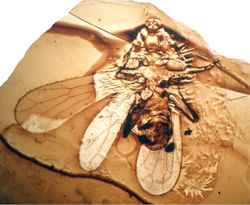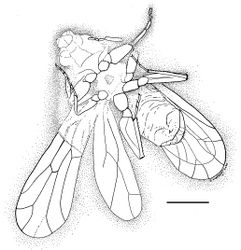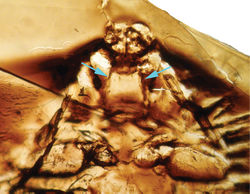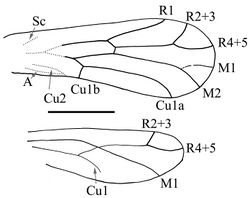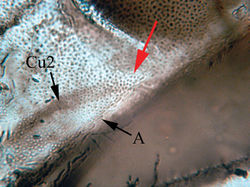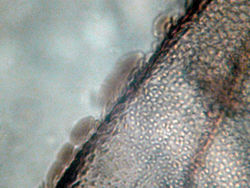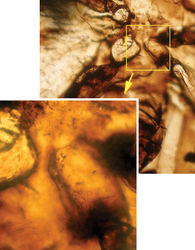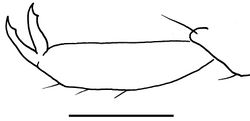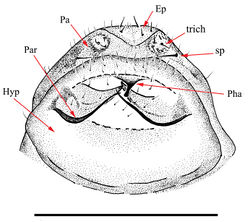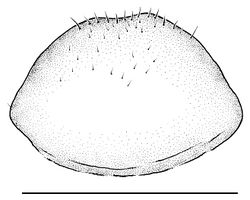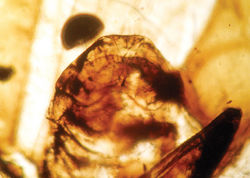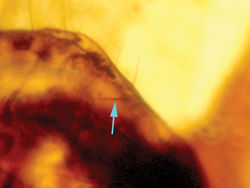Libanopsyllipsocus alexanderasnitsyni
| Notice: | This page is derived from the original publication listed below, whose author(s) should always be credited. Further contributors may edit and improve the content of this page and, consequently, need to be credited as well (see page history). Any assessment of factual correctness requires a careful review of the original article as well as of subsequent contributions.
If you are uncertain whether your planned contribution is correct or not, we suggest that you use the associated discussion page instead of editing the page directly. This page should be cited as follows (rationale):
Citation formats to copy and paste
BibTeX: @article{Azar2011ZooKeys130, RIS/ Endnote: TY - JOUR Wikipedia/ Citizendium: <ref name="Azar2011ZooKeys130">{{Citation See also the citation download page at the journal. |
Ordo: Psocoptera
Familia: Psyllipsocidae
Genus: Libanopsyllipsocus
Name
Libanopsyllipsocus alexanderasnitsyni Azar & Nel, 2011 sp. n. – Wikispecies link – ZooBank link – Pensoft Profile
Holotype
Specimen n° 30 (male, coll. Azar); provisionally deposited in the Muséum National d’Histoire Naturelle, Paris, France.
Locality and horizon
Lower Cretaceous, Upper Barremian – Lower Aptian, amber of Hammana-Mdeyrij, Caza, Baabda, Mohafazat Jabal Loubnan, central Lebanon.
Etymology
In honor of our friend Prof. Alexandr P. Rasnitsyn, a world authority in entomology and palaeoentomology.
Diagnosis
As for the genus (vide supra).
Description
Dorsal parts of head and body not preserved. Body and wings without scales (Figs 1–2). Head elongate (but cannot be measured accurately due to state of preservation), sublingual sclerite and hypopharynx with two distinct filaments (Fig. 3). Forewing transparent (Fig. 4), with infrequent small setae, 0.96 mm long, 0.35 mm broad; apex rounded; Sc badly preserved, not reaching C nor R; R1 reaching costal margin 0.73 mm from wing base; pterostigma absent; Rs separating from R 0.46 mm from wing base; Rs bifurcating into R2+3 and R4+5 at 0.76 mm; R2+3 curved, reaching wing margin 0.83 mm distally; R4+5 curved, reaching wing margin at 0.95 mm distally; a transverse crossvein between Rs and M; fork of M into M1 and M2 0.8 mm from wing base, but one wing is aberrant in having M simple [a frequent teratology in Psyllipsocidae as noted by Lienhard (1998)[1]]; Cu1 bifurcating into Cu1a and Cu1b 0.36 mm from wing base forming a free elongate and narrow areola postica; Cu1a much longer than Cu1b; Cu2 (badly preserved) joining anal vein at posterior wing margin in a nodulus 0.28 mm from wing base (Fig. 5); A strongly convex. Wing margin glabrous (Fig. 6), similar in structure to that illustrated by Lienhard (1998: 111, fig. 31b). Hind wing transparent (Fig. 4), bare and smaller than forewing, about 0.75 mm long, 0.24 mm broad; free or individualized and distinct arm of R1 missing; Rs forked into R2+3 and R4+5 0.16 mm from wing apex; basal cell present; simple M reaching wing margin apically; basal part of wing badly preserved. Hind leg with tibia + tarsi slightly longer than abdomen. Coxal rasp of Pearman’s organ present on hind leg (Fig. 7), but without tympanum (the coxal rasp is preserved on one leg as the coxal area is missing on the other leg). Tibiae with two apical spurs on inner sides; all tarsi three-segmented with first tarsomere longer than others; pretarsal claws with a preapical tooth, without microtrichia nor pulvillus (Fig. 8). Abdomen 0.52 mm long, 0.32 mm broad; telson with epiproct and paraproct as represented in Figs 9–12, paraproct with a rounded hemispherical sensory area of trichobotria, and a spine in its ventral inner side; male genitalia with simple hypandrium, aedeagus with phallosome presenting parameres with curved arms not fused anteriorly as represented in Fig. 9 (it can be seen owing to transparency of sclerites and is comparable in structure to what occurs in other Psyllipsocidae (cf. Lienhard 1998[1]: 112, fig. 32b).
Original Description
- Azar, D; Nel, A; 2011: The oldest psyllipsocid booklice, in Lower Cretaceous amber from Lebanon (Psocodea, Trogiomorpha, Psocathropetae, Psyllipsocidae) ZooKeys, 130: 153-165. doi
Other References
Images
|
